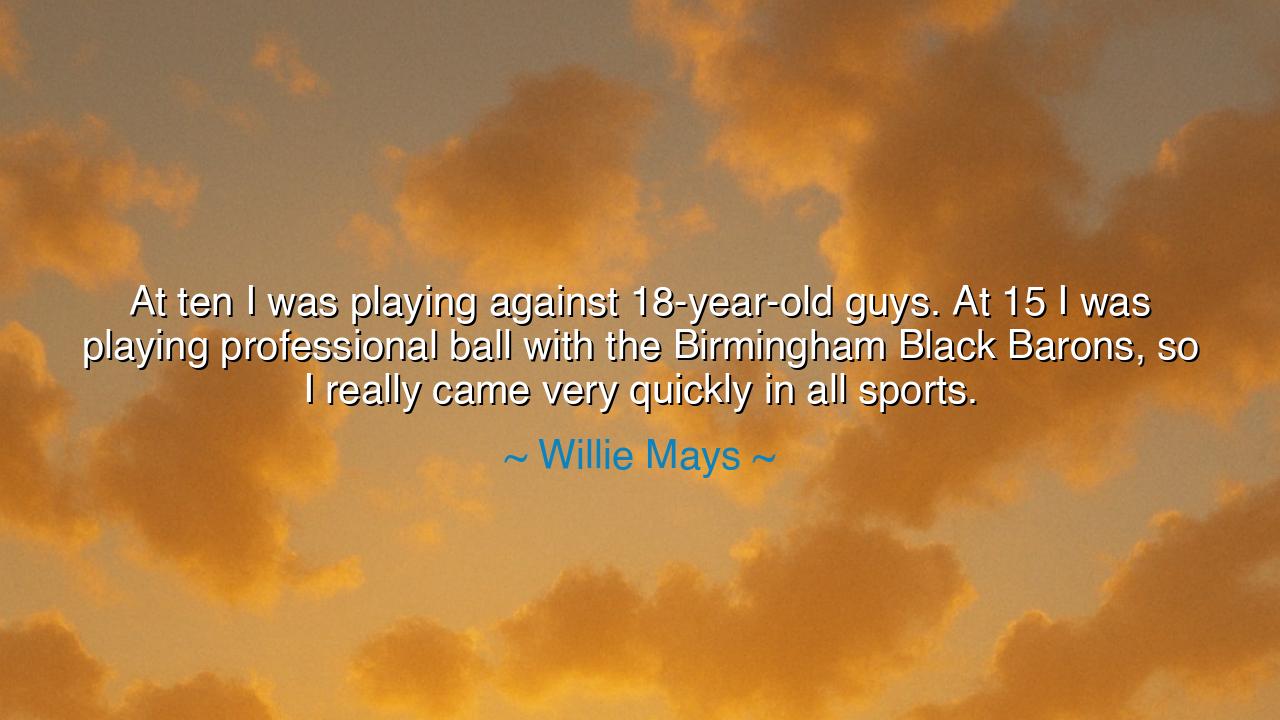
At ten I was playing against 18-year-old guys. At 15 I was
At ten I was playing against 18-year-old guys. At 15 I was playing professional ball with the Birmingham Black Barons, so I really came very quickly in all sports.






Willie Mays once declared: “At ten I was playing against 18-year-old guys. At 15 I was playing professional ball with the Birmingham Black Barons, so I really came very quickly in all sports.” These words, though simple, shine like a beacon of human excellence, revealing the story of one who rose beyond the limits of age and circumstance. They are the testimony of a youth who bore within him the gifts of greatness, and who, through courage and perseverance, became one of the immortal names in the history of sports.
The heart of his saying is the mystery of early mastery. At ten, when most children are still learning the rhythms of play, Mays was competing against men nearly twice his age. At fifteen, when most youths are just discovering their talents, he was already walking onto the field as a professional, carrying not the nerves of a boy but the resolve of a man. His life, accelerated and sharpened by challenge, became proof that talent is a seed, but discipline and courage are the soil in which it grows.
Yet the story of Mays is not only about personal triumph—it is about context, struggle, and history. When he played for the Birmingham Black Barons, the nation was still divided by the cruel barriers of segregation. The doors of Major League Baseball had only just begun to creak open through the courage of Jackie Robinson, and for a young Black man to rise in that world required not only skill but unyielding resilience. Mays’ words remind us that his journey was not merely a child’s game, but a march against the weight of injustice. His greatness came swiftly, yes, but it came in the face of obstacles that would have broken lesser spirits.
History offers us many such figures whose greatness bloomed early, often amid hardship. Alexander the Great, at fifteen, was already commanding armies, his youth no hindrance to his ambition. Mozart, as a child, composed music that stirred kings and queens. These prodigies remind us that sometimes the fire of destiny burns brightest in the young, not because they are shielded from struggle, but because they are thrust into it and forced to grow strong. Mays, in his own field of play, was one such figure—a boy who became a man too soon, yet carried that burden with grace.
But his words also carry a deeper lesson: that growth often comes fastest when we face challenges beyond our years. Mays did not grow by playing against boys his own age—he grew by testing himself against men stronger, older, and more experienced. The pressure forged him into steel. So too in life, if we remain only in the company of equals, we grow slowly. But when we place ourselves among those who surpass us, we are forced to rise, to stretch, to discover powers we did not know we had.
The lesson for us is plain: seek out challenges that seem greater than you. Do not fear to stand among those who seem stronger, wiser, or more advanced. For it is in such company that your hidden strength awakens. Like Mays, who faced men as a boy and professionals as a youth, you too must step boldly into arenas that test you. Let difficulty be your teacher, and let courage be your guide.
So I say to you: remember the words of Willie Mays. Let them stir your heart to rise beyond comfort, beyond fear, beyond the walls others place around you. Whether in sports, in learning, in art, or in life itself, place yourself among the giants and grow tall beside them. For greatness does not wait until you are ready—it calls you when you are young, when you are unprepared, and it demands that you rise. Answer that call, and you too may find, like Mays, that you come quickly into strength, into mastery, and into the immortality of those who dared to begin before their time.






AAdministratorAdministrator
Welcome, honored guests. Please leave a comment, we will respond soon